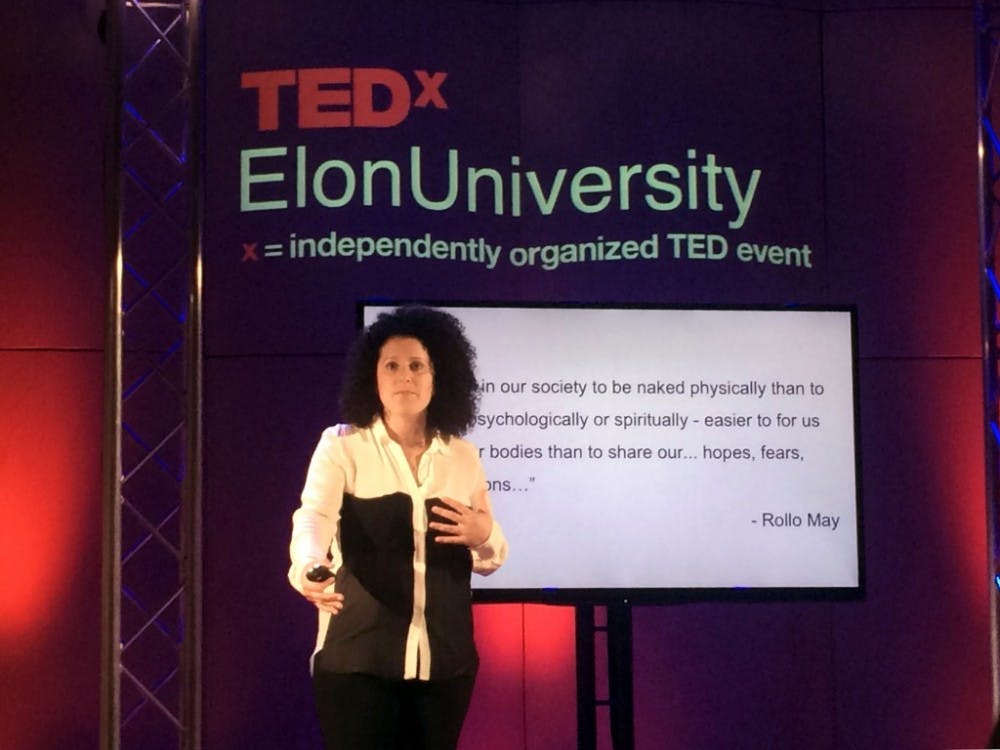Elon University’s second-annual TEDx pushed the ideal that changing the world starts with the individual.
Nearly 125 students, faculty, staff and community members gathered in Yeager Hall Feb. 22 as six speakers presented ideas on a range of topics pertaining to this year’s theme, “Waiting on the World to Change.”
The event, directed by Elon students Johanna Rosen and Meredith Berk, was organized to bring TED’s mission of “ideas worth spreading” to Elon.
“We live in a society where so much change is either not happening at all or is happening much too slowly,” Rosen said. “So I felt having a wide variety of speakers address some of these issues would make a powerful statement. And if you ask me, it definitely did.”
The afternoon’s first speaker, Jennifer Thompson, a New York Times best-selling author and judicial reform advocate, recounted the story of her brutal rape as an Elon senior nearly 30 years ago. The man Thompson accused — Ronald Cotton — was tried, convicted and jailed. Ten years later, DNA proved Cotton was innocent, so he was exonerated and released from prison.
Together, Cotton and Thompson now lobby to abolish the death penalty and revise police eyewitness line ups, as well as fighting for rights for the wrongly convicted. The man whom she wanted to die for what she thought he had done to her, Thompson said, was the only person who could help her heal and begin to fight for change.
“What are we waiting for? Who are we waiting for?” Thompson said. “The time is now. [The person] is you.”
Joining her in the effort, Duke University professor of law Theresa Newman took the stage to discuss her love of law and her fight to eliminate the hundreds of wrongful convictions that occur every year in the United States. Because of DNA testing, Newman said, about 325 people have been exonerated to date. This fact is something prosecutors must accept, she said, because the justice system is changing.
“We’re all waiting on human nature to change, but the change is a return to justice and a return to truth,” Newman said.
According to speaker Emily Greener, co-founder and CEO of the nonprofit I Am That Girl, the only way to make change happen is to be a leader. “If we’re going to be champions of changing the world, we need to go first,” Greener said. Her nonprofit exemplifies this through its dedication to inspiring and empowering girls to become their best selves while leading others to do the same.
Elon University’s I Am That Girl chapter boasts more than 550 Facebook likes and has a weekly meeting attendance of more than 50 girls, said Katherine Korol, an Elon sophomore and member of I Am That Girl Elon who attended TEDx to hear Greener’s talk.
Leading with vulnerability is one of the most important things we can do for ourselves because it establishes connection and trust with others, Greener said.
“We’re a follow-the-leader society,” Greener said. “Will you choose to be a leader? Will you choose to be known?”
There are two types of leaders in our society, said speaker Harry Cohen, a psychologist who works with management leaders and organizations to teach the principles of “heliotropic” leadership. The term, often used in reference to plants, means the growth or movement of a fixed organism, Cohen said.
“The heliotropic effect tells us that all living systems tend to move toward self-sustaining systems, not depleting ones,” he said.
His experience with company executives has proven the more positive and gratuitous leaders are, the more their employees and their company succeed.
When people make an effort to be positive energizers — attentive listeners who are compassionate and encouraging — it’s contagious, Cohen said.
“Be the sun, not the salt,” Cohen said.
Innovator, application designer and recent Vancouver Film School graduate Ian Brady is the leader of a platform he calls “Vision.” The idea began after he realized the college climate had changed drastically since the World War II era when college was for scholars and free thinkers alike. Colleges are standardizing everyone, Brady said, because they can’t keep up with the sheer number of students they’re admitting.
Brady created a graphic presentation illustrating the need for individualization of students and a return to a liberal arts foundation.
“The goal is to promote the individual and shape the future,” Brady said.
David Levy applied a similar argument to the financial sector. The Elon parent and chairman of The Jerome Levy Forecasting Center, a macroeconomic forecasting and consulting firm, positioned his talk around the question, “Where do profits come from?” Profits are rewards for innovation and raising standards of living, he said.
“You don’t have to be a mathematician or an economist to understand it,” Levy said. “The world needs to look at a new perspective.”


